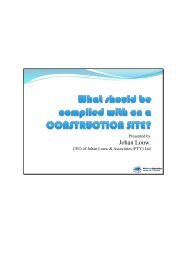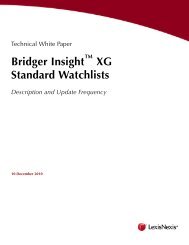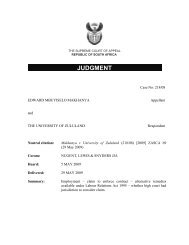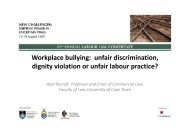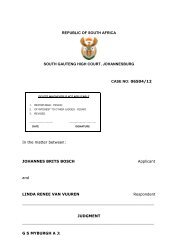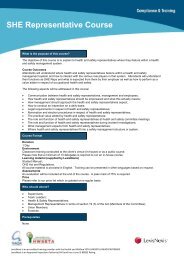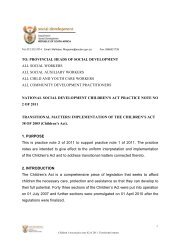Mogothle v Premier of the Northwest Province and others
Mogothle v Premier of the Northwest Province and others
Mogothle v Premier of the Northwest Province and others
Create successful ePaper yourself
Turn your PDF publications into a flip-book with our unique Google optimized e-Paper software.
MOGOTHLE v PREMIER OF THE NORTH WEST PROVINCE & ANOTHERVAN NIEKERK J [2009] 4 BLLR 331 (LC) 339[22] The Gumbi judgment was confirmed in Boxer Superstores Mthatha &ano<strong>the</strong>r v Mbenya [2007] 8 BLLR 693 (SCA). In that case, <strong>the</strong> court held:“This court has recently held that <strong>the</strong> common law contract <strong>of</strong> employmenthas been developed in accordance with <strong>the</strong> Constitution to include a right to apre-dismissal hearing (Old Mutual Life Assurance Co SA Ltd v Gumbi). Thismeans that every employee now has a common law contractual claim – notmerely a statutory unfair labour practice right – to a pre-dismissal hearing.”(At paragraph 6 <strong>of</strong> <strong>the</strong> judgment.)[23] More recently, in Murray v Minister <strong>of</strong> Defence [2008] 6 BLLR 513(SCA), <strong>the</strong> SCA derived a contractual right not to be constructively dismissedfrom what it held to be a duty on all employers <strong>of</strong> fair dealing atall times with <strong>the</strong>ir employees (at 517C). This obligation, a continuing obligation<strong>of</strong> fairness that rests on an employer when it makes decisions thataffect an employee at work, was held by <strong>the</strong> court to have both a procedural<strong>and</strong> a substantive dimension.[24] The development <strong>of</strong> <strong>the</strong> common law by <strong>the</strong> SCA is not uncontroversial. Ithas been criticised, amongst o<strong>the</strong>r grounds, for opening <strong>the</strong> door to a dualjurisprudence in which common law principles are permitted to competewith <strong>the</strong> protection conferred by <strong>the</strong> unfair dismissal <strong>and</strong> unfair labour practiceprovisions <strong>of</strong> <strong>the</strong> LRA (see, for example, Halton Cheadle “Labour Law<strong>and</strong> <strong>the</strong> Constitution”, a paper given to <strong>the</strong> annual SASLAW Conference inOctober 2007 <strong>and</strong> published in Current Labour Law 2008, <strong>the</strong> commentsby PAK le Roux at 3 <strong>of</strong> <strong>the</strong> same publication, <strong>and</strong> <strong>the</strong> article by Paul PretoriusSC <strong>and</strong> Anton Myburgh “A Dual System <strong>of</strong> Dismissal law: Commenton Boxer Superstores Mthatha & ano<strong>the</strong>r v Mbenya (2007) 28 ILJ 2209(SCA)” published in (2007) 28 ILJ 2172). 2 Be that as it may, <strong>the</strong> SCA hasunequivocally established a contractual right to fair dealing that binds allemployers, a right that may be enforced by all employees both in relation tosubstance <strong>and</strong> procedure, <strong>and</strong> which exists independently <strong>of</strong> any statutoryprotection against unfair dismissal <strong>and</strong> unfair labour practices. 3 This Courtis bound by <strong>the</strong> authorities to which I have referred <strong>and</strong> is obliged, in <strong>the</strong>absence <strong>of</strong> any higher authority, to enforce <strong>the</strong> contractual right <strong>of</strong> fair dealingas between employer <strong>and</strong> employee.Does <strong>the</strong> Chirwa judgment deny <strong>the</strong> applicant a claim in contract?[25] This brings me to <strong>the</strong> respondents’ argument that in <strong>the</strong> absence <strong>of</strong> anyreliance by him <strong>of</strong> <strong>the</strong> provisions <strong>of</strong> <strong>the</strong> LRA, this Court has no jurisdictionto entertain <strong>the</strong> applicant’s claim. Mr Pretorius SC, who with Mr________________________2 The authors <strong>of</strong> <strong>the</strong> latter article acknowledge that <strong>the</strong> South African Constitution contemplates<strong>the</strong> development <strong>of</strong> <strong>the</strong> common law, but <strong>the</strong>y note that <strong>the</strong> English courts, for what appear tobe policy-related reasons, have adopted a ra<strong>the</strong>r different course. The authors quote Lord Milletin Johnson v Unisys Ltd [2001] 2 All ER 801 (HL) who said:“But <strong>the</strong> creation <strong>of</strong> a statutory right [against unfair dismissal] has made any such development<strong>of</strong> <strong>the</strong> common law both unnecessary <strong>and</strong> undesirable . . . <strong>the</strong> co-existence <strong>of</strong> two systems,overlapping but varying in matters <strong>of</strong> detail <strong>and</strong> heard by different tribunals, would bea recipe for chaos. All coherence in our employment laws would be lost.” (At paragraph80.)3 There is an obvious overlap here – <strong>the</strong> jurisprudence developed under <strong>the</strong> statutory regime willobviously <strong>the</strong> nature <strong>and</strong> extent <strong>of</strong> <strong>the</strong> contractual right <strong>of</strong> fair dealing.ABCDEFGHIJ




